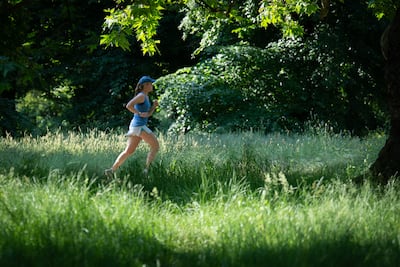As a family doctor, Dr Haider Ali knows how important regular exercise is to keep him healthy.
But his responsibilities manning a busy Dubai clinic mean he struggles to find the time. So he works out mostly on his days off.
He is what is known as a weekend warrior – a person who, out of necessity or choice, gets in most of their steps, reps, miles and sweat – during one or two sessions a week.
“I try to do high-intensity exercise during the week, but essentially it ends up being the weekend, Friday and Sunday predominantly,” the 39-year-old Briton said.
Now a study suggests that Dr Ali and other weekend warriors like him may actually be on to something.
New research shows that cramming workouts into one or two days is associated with a similar lower risk of heart problems to more regular activity.
“Our findings suggest that efforts to improve physical activity, even if concentrated within one to two days of the week, should be beneficial for cardiovascular risk,” senior author Patrick Ellinor, acting chief of cardiology and co-director of the Corrigan Minehan Heart Centre at Massachusetts General Hospital in the US, told The National.
“It appears that it is the total volume of activity, rather than the pattern, that matters most.”
The UK’s National Health Service recommends that adults should aim to do at least 150 minutes of moderate intensity activity a week, or 75 minutes of vigorous activity.
However, until now, it was not clear whether concentrated bursts of exercise can provide the same benefits as more evenly-distributed activity.
To study whether it had the same effect, researchers looked at data from almost 90,000 adults in the UK Biobank who wore activity trackers on their wrists to register speed and distance.
The devices recorded the total physical activity and time spent at different intensities for a full week.
The study, which was published in the Jama journal, found 33.7 per cent of people in the study were inactive, registering less than 150 minutes of moderate-to-vigorous physical activity per week, while 42.2 per cent were active weekend warriors, with at least 150 minutes with at least half achieved in one to two days.
A quarter, or 24 per cent, were active-regular, registering at least 150 minutes with most exercise spread out over several days.
According to the findings, both activity patterns were associated with “similarly lower risks of heart attack”, at 27 per cent and 35 per cent lower risks for active weekend warriors and active-regular, respectively, compared with inactive.
The risks were similarly lower for heart failure, at 38 per cent and 36 per cent less risk, atrial fibrillation, at 22 per cent and 19 per cent lower risk, and stroke, at 21 per cent and 17 per cent lower risk.
“Our study … found that both a weekend warrior-type activity pattern and a more even activity pattern were each associated with similar reductions in risk of heart attack, heart failure, atrial fibrillation, and stroke as compared to inactive individuals,” Dr Ellinor said.
The next step is to study whether weekend warrior-type patterns of exercise have similar effects on other diseases, he said.
“Our results may also motivate future studies of physical activity interventions delivered in a concentrated fashion, which may be more practical and efficient,” Dr Ellinor told The National.
Nikki McLeary, a Dubai-based adventure and human performance scientist who reviewed the data, said the findings “highlight the importance of integrating physical activity into busy schedules whichever way you can”.
“Even if you still cannot meet recommended time and intensity targets, some physical activity is better than none. It also gives you a really positive base to build upon. Able to exercise outdoors in a natural environment?
“Then all the better still,” Ms McLeary said.
The type of exercise you do is important too, said Dr Ali, who commented on a post on the topic on the British Expats Dubai and UAE Facebook group.
“For us who have desk jobs or sedentary jobs, it’s really important to have some muscle tone,” he told The National.
“Because if my exercise was predominantly jogging, for example, more or less the moment you stop the jogging, even if it’s an hour’s run, you stop burning calories. So the exercises I tend to do build some tone and muscle, so when I am sat my basal metabolic rate, the background burning, if you like, is ongoing for six or seven hours longer.”
But being a weekend warrior can come with risks. Injuries are a common woe.
“Someone who exercises twice a week might be more stiff than someone who is regularly going at it, but if they spend a good 10 minutes stretching properly, then they reduce their risk of injury quite significantly,” said Dr Ali, who used to work as a sports doctor in Manchester.
“If they just pick up a basketball or a weight and just go for it, or just start running, then unfortunately the risks tend to be higher.”
Aching muscles also occur more frequently among weekend warriors.

“It can affect anyone, it’s particularly prevalent when you are trying a new activity or pushing yourself harder than usual,” Dr Ali said.
“So for a weekend warrior that’s one of the things you tend to get quite frequently.”
But there are ways to protect yourself.
“My top three tips would be to warm up, hydrate and listen to your body,” Dr Ali said.
“If you’re feeling that you can’t quite do it today, do less, because you are still doing something.”


